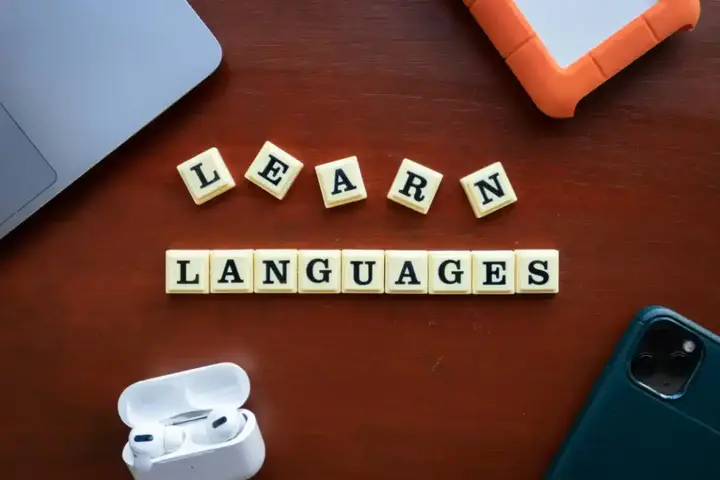What are the most important languages required in the labor market? And how to learn it for free?

Learning languages is no longer an entertainment matter or limited to intellectuals or professionals related to communication of all kinds; it has become - especially in recent years and with the strong spread of the Internet - an imperative duty for anyone who wishes to enter the professional labor market or the world of various businesses. Many doors can only be knocked on by mastering one or more specific languages.
Show key points
- Learning multiple languages has become a necessity rather than a luxury in today's globalized job market and business world.
- Mastering additional languages beyond your mother tongue and English significantly boosts your chances of career advancement and international job opportunities.
- Knowing a foreign language enhances travel experiences by enabling deeper cultural understanding and communication with locals.
- ADVERTISEMENT
- Language learning contributes to personal development by increasing self-confidence, improving cognitive abilities, and expanding cultural awareness.
- English, Spanish, Chinese, French, and German are among the most important languages in the current labor market based on global usage and demand.
- Arabic has grown in professional relevance due to the expanding economies of Arab countries, making proper mastery of the language increasingly valuable.
- Free and diverse resources, such as apps, online courses, books, and speaking with native speakers, are widely available to support effective language learning.
If we say that English is the most widely used in most places, we will be wrong, because the world today with its various parts has become more open and demanding to communicate. The more languages you master besides your mother tongue and English, the better your chances will be in many fields.
Recommend
Why learn different languages?

There are many reasons why learning languages is important. Here are some of the main ones:
Better job opportunities with language learning
Learning a new language will improve your career opportunities. In today's interconnected business world, foreign languages are more important than ever. If you speak another language, you are more likely to get a job or a promotion. Learning another language is essential for many jobs. Many companies now require employees to speak a second language as job descriptions and skills, especially if they work in international business or tourism. The ability to speak multiple languages is also an increasingly sought-after skill in the global job market. Learning a new language can lead to new job opportunities abroad, and often even higher wages.
Learn languages for travel and leisure
Learning a new language can help you enjoy travel and entertainment more than you can imagine. When you can speak the local language in a country you visit, you can better communicate with the locals and understand their culture. This helps to broaden your perceptions and better understand the world. Each language is a window into a different culture. When you learn a new language, you also learn about the history, culture, and values of that culture. It's a great way to enjoy new experiences.
Learning languages for self-development
Everything you learn helps in your self-development, resulting in a better life, enlightened awareness, and many other benefits:
○ Boost self-confidence: Learning a new language can help you boost your self-confidence and self-esteem. When you learn a new skill, you feel accomplished and satisfied. This can also help you be more open to learning new things in the future.
○ Improve your cognitive skills: Studies have shown that learning a new language can help improve your cognitive skills, and strengthen memory and attention. And it helps slow down the process of mental aging. It is considered an unconventional way to get better critical thinking and problem-solving skills. It is known that when learning languages you should think about how to syntax and use vocabulary.
○ Broaden your cultural horizons: Learning another language helps you better understand other cultures. When you learn a new language, you also learn about the customs, traditions and values shared by native speakers of that language. For example, reading a literary novel in its original language is a great pleasure.
If you are thinking of learning a new language, there are many resources available. You can take a course at a school or university, or you can learn it yourself using online resources or books, apps, TV shows and movies in the language you learn. No matter which method you choose, learning a new language is an investment worth your time and effort.
What are the most important languages required in the labor market?

The most widely used languages in the business world depend on many factors, including a company's location, industry, and target markets. However, overall, English is the most spoken language in the business world, followed by Spanish, Chinese, French, and German.
This list was based on several reports, the most important of which are the "Language Skills in Business 2023" report issued by "LinkedIn" and the "Global Language Skills 2022" report issued by "HSBC", and we found that the most used languages in the business world are:
● English is the most widely spoken language in the business world, spoken by more than a billion people worldwide. It is the official language of many major countries, including the United States, Great Britain, and Canada. It is also a language that is used in many international organizations and multinational corporations.
Spanish is the second most widely spoken language in the business world, spoken by more than 500 million people worldwide. It is the official language of many major countries, including Spain, Mexico and Latin America. It is also the second most common language in the United States.
● Chinese is the third most used language in the business world, as it is spoken by more than 1.5 billion people worldwide, and thus it is the most spoken language in the world and is the official language in China, as it is spoken by several countries with a strong economy and huge business markets in Asia, and China is of course the second largest economy in the world.
● French is the fourth most widely spoken language in the business world, spoken by more than 300 million people worldwide. It is the official language of many major countries, including France, Switzerland and Belgium. It is also the second language of a good number of African and Asian countries. It is also the official language like English in many international organizations, such as the United Nations and the European Union.
● German is the fifth most widely spoken language in the business world, spoken by more than 100 million people worldwide. It is the official language of many major countries, including Germany, Austria and Switzerland.
Do you speak Arabic?
You are reading this article, so congratulations on speaking Arabic! It is one of the most used languages in the world in the labor market and its ranking is advanced among the 10 most used languages, specifically in recent years due to the opening of the economies of the Arab countries more and at an accelerated pace to the world. But make sure you speak and write properly and professionally. For example, in the GCC market, it requires good mastery of language and a good vocabulary in your field. It is also the official language in many Arab countries
How to learn languages for free

There are many free resources available for learning languages. Here are some examples:
● Websites and smartphone apps: There are many websites and smartphone apps that offer free language courses. Some famous examples are:
1. Duolingo: A website and app that provides free courses in more than 30 languages.
2. Memrise: A website and app that provides free courses in over 200 languages.
3. Italki: A site that connects you with online language teachers.
● Of free tutorials available online. There are many institutions that offer free or affordable online courses, such as: Some famous examples are Open Culture, FreeCoursesOnline, and Coursera.
● Online forums and groups can help you learn languages. You can find other people learning the same language as you, and get help from native speakers.
● There are many books and printed resources available for learning languages. You can find books for beginners and advanced alike.
● YouTube and Tik Tok channels; just search for the language you want to learn and you will be amazed by the amount of results and useful content! And in many ways you can choose from them what suits you.
● Sign up for cultural exchange programs: It's a great way to learn a new language and associated culture.
● Find opportunities to speak with native speakers: Talking with native speakers is a great way to practice the language and improve your skills.
Here are some specific free resources you can use to learn languages broken down by each of the top three languages, and we've added Arabic to improve and improve:
● English:
○ Duolingo
○ Memrise
○ BBC Languages
○ British Council
○ American Language Center
● Spanish Language:
○ Duolingo
○ Memrise
○ SpanishDict
○ MéxicoEscuela
○ LingoDeer
● Chinese Language:
○ Duolingo
○ Memrise
○ ChinesePod
○ HelloChinese
○ Italik
● Arabic Language:
○ Duolingo
○ Memrise
○ ArabicPod101
○ Babbel
○ Italik
Top tips for learning languages

● Set your goal before you start learning a new language: Do you want to be able to have simple conversations? Do you want to be able to read books and newspapers? Do you want to be able to work in a country that speaks this language? Setting your goal will help you stay on track.
● Choose a language that's right for you: There are many different languages you can learn. It is important to choose a language that is suitable for your interests and goals. If you are interested in traveling to a country, choose to learn the official language of that country. If you're interested in a particular culture, choose to learn the language spoken by native speakers of that culture.
● Start with the basics: Once you've chosen the language you want to learn, this means learning the alphabets, sounds, and basic vocabulary. There are many resources available to help you learn the basics, such as books, websites, and apps.
● Set aside time daily to learn the language: Even if it's only 30 minutes a day, a commitment to language learning will help you progress.
● In the beginning, mix different methods that do not depend on only one way to learn the language, so that you can reach the method that suits you. Use a variety of means, including reading, listening, speaking and writing.
● Don't be afraid to make mistakes, it's normal when you're learning a new language. Don't be afraid to speak the language, even if you make mistakes. The more you talk, the better you get.
● Practice language regularly: The best way to learn a new language is to practice the language regularly. Try to set aside some time each day to practise the language, even if it's just a few minutes. You can practice language by talking to someone who speaks the language, by watching movies or TV shows, or listening to music in a specific language.
● Find online communities, educational or cultural groups: This can be a great way to connect with other people learning the same language.
● If possible, travel to a country where they speak the language you are learning: Traveling to a country where they speak the language you are learning is a great way to practice the language and learn more about the culture.
● Use modern learning techniques: There are many modern technologies that can help you learn languages, such as language learning applications and virtual reality.
● Don't be afraid to experience the new: there are many ways to learn languages. Don't be afraid to try new ways of practicing the language.

Of course, learning a language can take time and effort, so don't despair. Learning a new language takes time and effort. Do not bemoan or get angry if you do not immediately master the language. Keep practicing and you will get better over time.But it will be a very useful investment in your professional and personal life.








